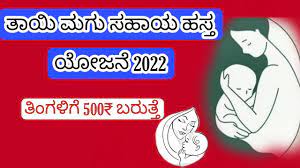Step 2.3 Thayi Magu Sahaya Hastha
Thayi Magu Sahaya Hastha, a nutrition assistance and pre-school education focused entitlement, applies to registered woman construction workers and their first two children for a duration of three years from the date of delivery.
What are the workers entitled to?
A registered woman construction worker is entitled to:
- Per child monthly Rs 500, for 3 years from the date of delivery to support early childhood education and provide nutrition assistance (lifetime total entitlement value of Rs 36,000 per woman).
- Applies to the first 2 children only.
Applications should be submitted within six months of delivery.
Please note: miscarriages are counted as live births.
What are the eligibility criteria for accessing this benefit?
- All registered female construction workers with a valid labor card are eligible for the Thayi Magu Sahaya Hastha scheme.
Wife of a construction worker is not eligible for this benefit.
What type of documents required for application?
- Filled application form XVII-A
- Proof of Bank Account
- Photo of Child
- Employment Certificate
- Attested proof of identity/labor card issued by the Board.
- Discharge Summary & Birth Certificate of Child
What is the procedure to apply?
Applicant needs to submit the application via the Seva Sindhu portal.
- The applicant is required to complete and submit the application.
- The application will go through processing and verification conducted by a Senior/Labour Inspector.
- Subsequently, the application will be subject to review and approval by a Labor Officer.
Every application shall be accompanied by Birth Certificate of the Child obtained from the Registrar of Birth and Deaths
Application need to be submitted within 6 months of delivery and annually for up to three years.
Application can be submitted every year (up to three years)
Child living Affidavit shall be submitted for second and third year
Common reasons why construction workers fail to receive the benefits under BoCW schemes
Exclusion owing to policy design
- Scheme only for registered woman construction worker with individual card.
- Proof of child's birth is necessary. Some female migrants lack official birth documents due to home delivery, making them ineligible.
- Child living affidavit needed for second and third years, obtaining a lawyer's affidavit for a second child can be challenging and costly.
- Applications can be submitted within six months of delivery.
- Miscarriages counted as live births, only two live births allowed.
Pregnant women must demonstrate a work experience of 90 days before delivery, which can be challenging, making them ineligible if this requirement is not fulfilled.
Minimum one-year waiting period for maternity benefit eligibility.
Only registered women construction workers are eligible; wives of construction workers are not eligible.
Exclusion owing to lack of supporting documentation
- Migrants often face challenges in presenting a ration card as a mandatory document. In some instances, migrants leave their ration cards in their native places to ensure a continued supply of rations to family members, posing a difficulty for migrants in providing the required documentation.
- Changing the address in Aadhaar, even within Bangalore, poses a challenge for migrant workers who relocate after marriage.
- A birth certificate for the child is necessary. In instances of home delivery, acquiring a discharge slip poses a challenge, creating obstacles in obtaining the birth certificate.
- An Employment Certificate is required, but who work irregularly at various sites, obtaining the seal or signature of contractors poses a challenge in acquiring the certificate.
- Applications can be submitted every year, for up to three years
- Workers may submit applications every year, extending up to three years. However, some workers may be unaware of this, leading to their exclusion from the scheme benefits.
Exclusion owing to eligibility conditions
-
Eligibility for this scheme requires women to be registered as construction workers, and wives of construction workers are not eligible.
-
Scheme is exclusively available to vulnerable households, mandating the possession of a ration card.
Exclusion owing to renewal related process
- The program spans three years and is renewable annually, but knowledge gaps can hinder the renewal process after the first year.

